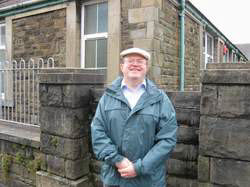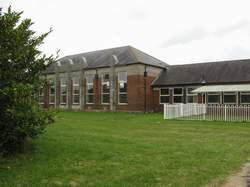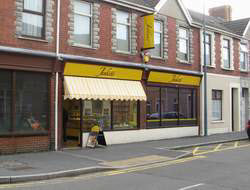Abandoned Communities ..... Machynys
A school opened in Machynys in March 1894. Until that date education had been provided in a hired room. You can read about the opening of the school in the Llanelli Mercury for 15 March 1894. Tea and cake were provided, and the headmistress, Miss Stuart, and her staff did all in their power to make the children happy. Nor were their efforts unsuccessful. The children were addressed by Mr C S Read, chairman of the board of management.
In 1916 Richard Thomas & Co., which by that time owned all four tinplate works in the Machynys peninsula, made an offer to buy the school. The offer was accepted surprisingly readily, and the school buildings were converted into offices for Richard Thomas. Subsequently most children went to New Dock School on the corner of New Street and Cornish Place. New Dock School suffered severe overcrowding, especially on the girls’ side, until in 1938 Morfa School opened in Olive Street. New Dock School then became an infants school, and pupils went on to Morfa School for their junior education.
More information on the history of New Dock and Morfa schools can be found in Benita Rees, New Dock and Morfa Schools Remembered, in A People’s History: Glanymor and Tyisha, Volume 4, published by Glanymor and Tyisha History Group, 2007.
Sports and leisure activities in Machynys and Bwlch-y-gwynt included football and pigeon racing. Bwlch-y-gwynt had its own team, Bwlch-y-gwynt AFC, who played on a pitch close to Sea View Terrace. The club still exists. Several residents of Maliphant Row kept pigeons in sheds behind their houses. The pigeons would be released in France or the Shetland islands, and return to cages in the Mermaid pub in Biddulph Street.
There was a pub in Machynys itself, the Globe Inn in Maliphant Row. Alcoholic refreshments could also be obtained at Y Tafarn, an off licence run from the front room of a house in Sea View Terrace, Bwlch-y-gwynt. A popular place at the end of a shift, workers would receive their beer in a jug, take their jugs across the road to a grassy bank, and return the empty jugs later.
There were several sweet shops in the two communities, but for most other items residents would either have to go shopping up New Dock Road or in the centre of Llanelli or else rely on visiting tradesmen. Leslie Pitt, the bread man, used a horse and cart to make his deliveries until World War II. Later he acquired a van. Others delivered meat, salt, newspapers, and ice cream. Batteries and radios could be bought from Jack-y-Batri.
Shops in New Dock Road included the post office, chemists, several hairdressers, and two hat shops. Jenkins the baker’s shop is still there, and still proclaiming its establishment in 1921.
One trade for which there was little demand was the delivery of coal. Regular coal deliveries were made to Machynys Farm, but otherwise people were inclined to help themselves from various coal dumps, trucks, and other unofficial sources. Trucks left standing near Maliphant Row had a reputation for holding coal of a particularly high quality.
Most of this information about local traders has come from Nevil Williams, Making Money in Machynys, A People’s History: Glanymor and Tyisha, Volume 2, published by Glanymor and Tyisha History Group, 2005.
From the 1920s there was an active Christian evangelical movement in Machynys and Bwlch-y-gwynt, led by a local man, Eddie John. Eddie and Annie John moved into 20 Springfield Terrace in 1925, and soon afterwards converted their front room for use as a Sunday School. Attendance was sparse at first, but soon grew to 103.
A few years later Eddie John was given the lease on a small area of land, and with help and support from several sources opened the Burry Gospel Hall in January 1931. At first the Gospel Hall was seen as a branch of the Evangelistic Hall in the centre of Llanelli, but before long it was granted the status of an independent assembly. The Sunday School was transferred there, services were held every Sunday morning, and from time to time visiting preachers would come to the Gospel Hall to lead special missions.
Eddie John also became well known for his community work, which included visiting people who were ill or in distress, and helping to reconcile couples experiencing marital difficulties. He applied three rules to his visits to sick people: do not visit at meal times, do not stay longer than twenty minutes, and mind your own business. On one occasion Eddie’s help was sought by a man whose wife had lost her temper after he had squandered his wages in the pub. Eddie was able to calm the woman, and by the time he left the couple were kissing and hugging each other. On another occasion he intervened when a woman appeared intent on throwing herself into a pond, again succeeding in reuniting her with her husband.
Much more information on the life and work of Eddie John can be found in a book by Nevil Williams, Eddie John and the Lost Community, CMS Publishing, 2003.
In 1916 Richard Thomas & Co., which by that time owned all four tinplate works in the Machynys peninsula, made an offer to buy the school. The offer was accepted surprisingly readily, and the school buildings were converted into offices for Richard Thomas. Subsequently most children went to New Dock School on the corner of New Street and Cornish Place. New Dock School suffered severe overcrowding, especially on the girls’ side, until in 1938 Morfa School opened in Olive Street. New Dock School then became an infants school, and pupils went on to Morfa School for their junior education.
More information on the history of New Dock and Morfa schools can be found in Benita Rees, New Dock and Morfa Schools Remembered, in A People’s History: Glanymor and Tyisha, Volume 4, published by Glanymor and Tyisha History Group, 2007.
Sports and leisure activities in Machynys and Bwlch-
There was a pub in Machynys itself, the Globe Inn in Maliphant Row. Alcoholic refreshments could also be obtained at Y Tafarn, an off licence run from the front room of a house in Sea View Terrace, Bwlch-
There were several sweet shops in the two communities, but for most other items residents would either have to go shopping up New Dock Road or in the centre of Llanelli or else rely on visiting tradesmen. Leslie Pitt, the bread man, used a horse and cart to make his deliveries until World War II. Later he acquired a van. Others delivered meat, salt, newspapers, and ice cream. Batteries and radios could be bought from Jack-
Shops in New Dock Road included the post office, chemists, several hairdressers, and two hat shops. Jenkins the baker’s shop is still there, and still proclaiming its establishment in 1921.
One trade for which there was little demand was the delivery of coal. Regular coal deliveries were made to Machynys Farm, but otherwise people were inclined to help themselves from various coal dumps, trucks, and other unofficial sources. Trucks left standing near Maliphant Row had a reputation for holding coal of a particularly high quality.
Most of this information about local traders has come from Nevil Williams, Making Money in Machynys, A People’s History: Glanymor and Tyisha, Volume 2, published by Glanymor and Tyisha History Group, 2005.
From the 1920s there was an active Christian evangelical movement in Machynys and Bwlch-
A few years later Eddie John was given the lease on a small area of land, and with help and support from several sources opened the Burry Gospel Hall in January 1931. At first the Gospel Hall was seen as a branch of the Evangelistic Hall in the centre of Llanelli, but before long it was granted the status of an independent assembly. The Sunday School was transferred there, services were held every Sunday morning, and from time to time visiting preachers would come to the Gospel Hall to lead special missions.
Eddie John also became well known for his community work, which included visiting people who were ill or in distress, and helping to reconcile couples experiencing marital difficulties. He applied three rules to his visits to sick people: do not visit at meal times, do not stay longer than twenty minutes, and mind your own business. On one occasion Eddie’s help was sought by a man whose wife had lost her temper after he had squandered his wages in the pub. Eddie was able to calm the woman, and by the time he left the couple were kissing and hugging each other. On another occasion he intervened when a woman appeared intent on throwing herself into a pond, again succeeding in reuniting her with her husband.
Much more information on the life and work of Eddie John can be found in a book by Nevil Williams, Eddie John and the Lost Community, CMS Publishing, 2003.
Three
Nevil Williams outside New Dock School
Morfa School
Jenkins the bakery


